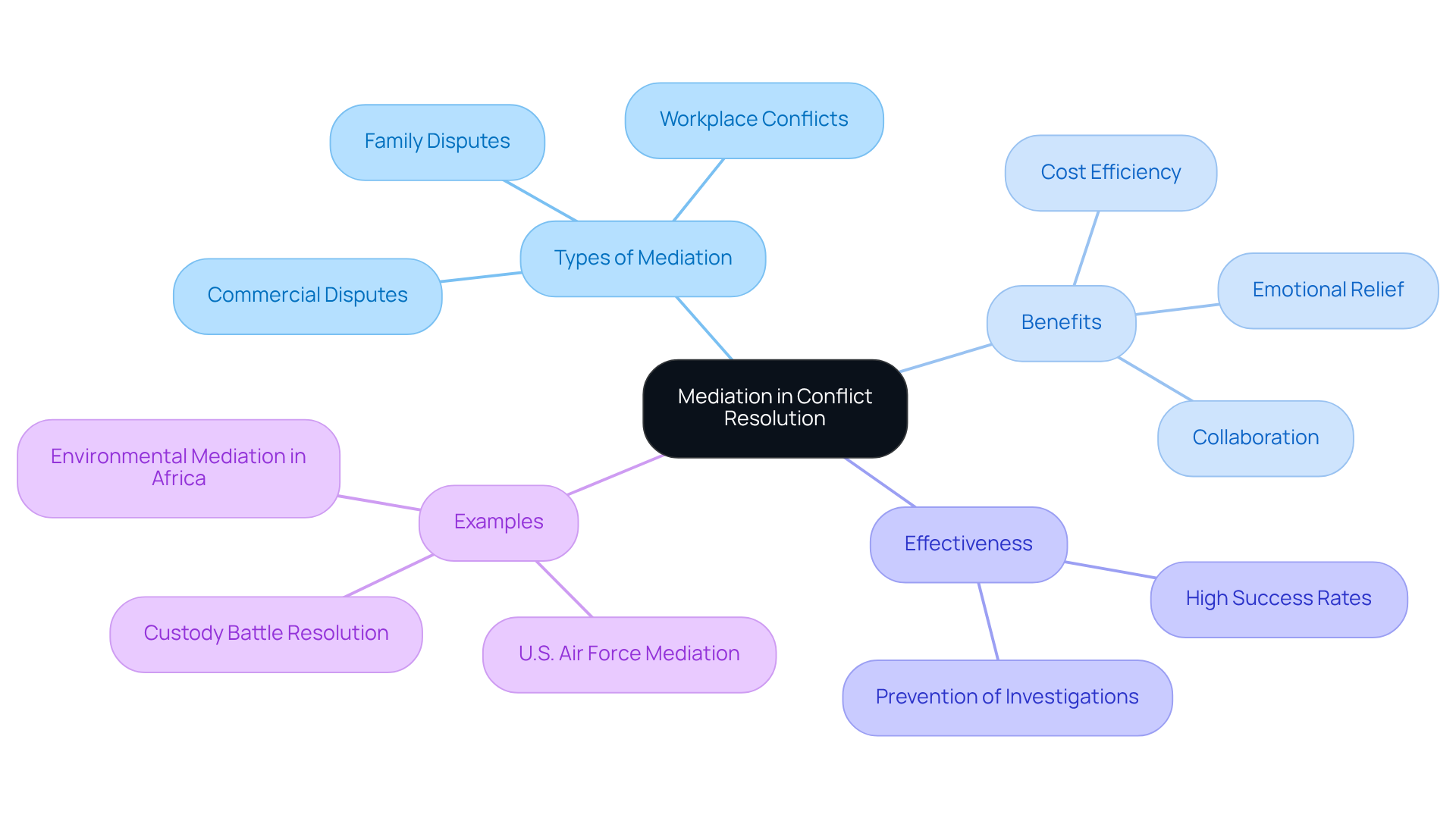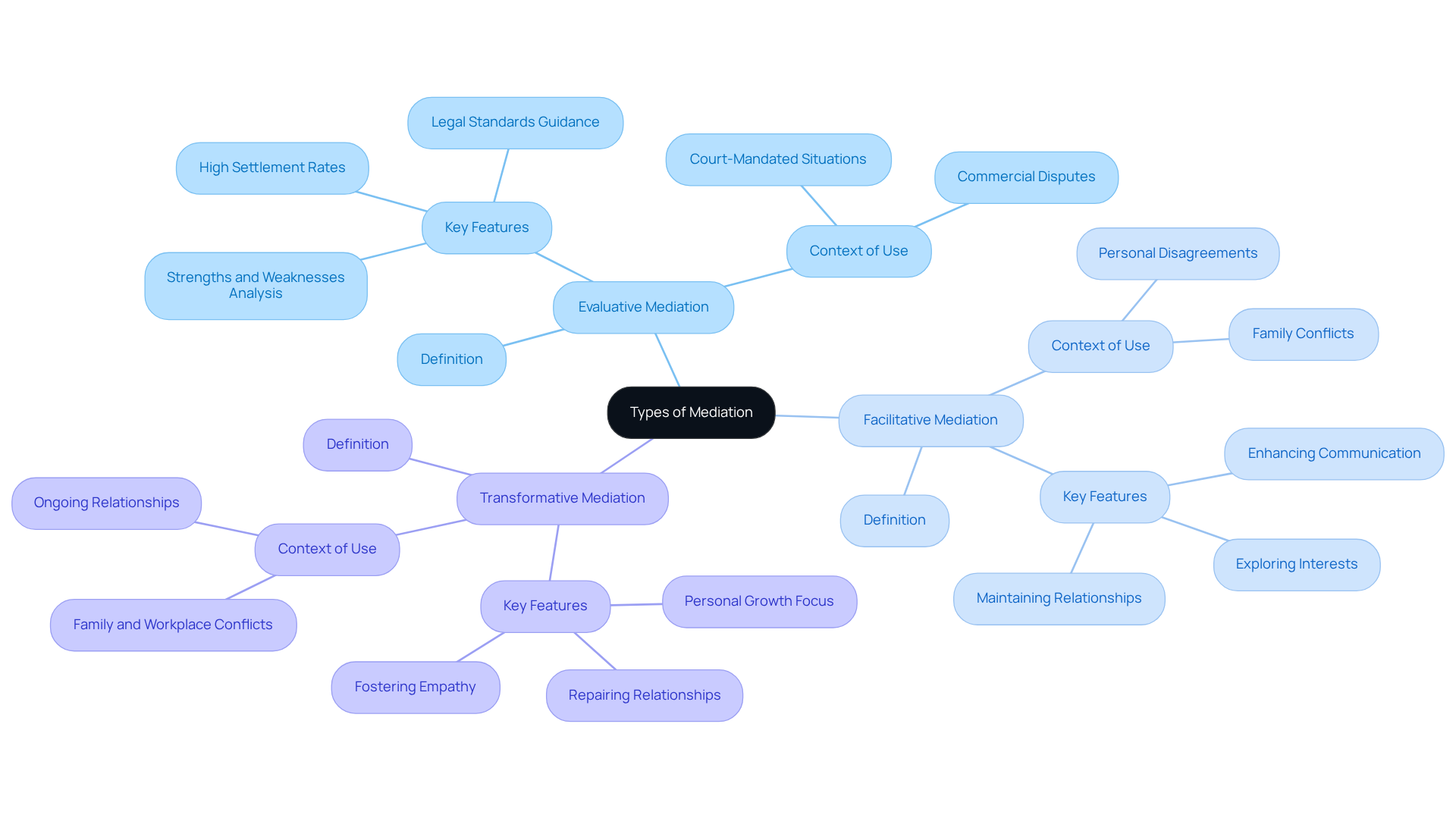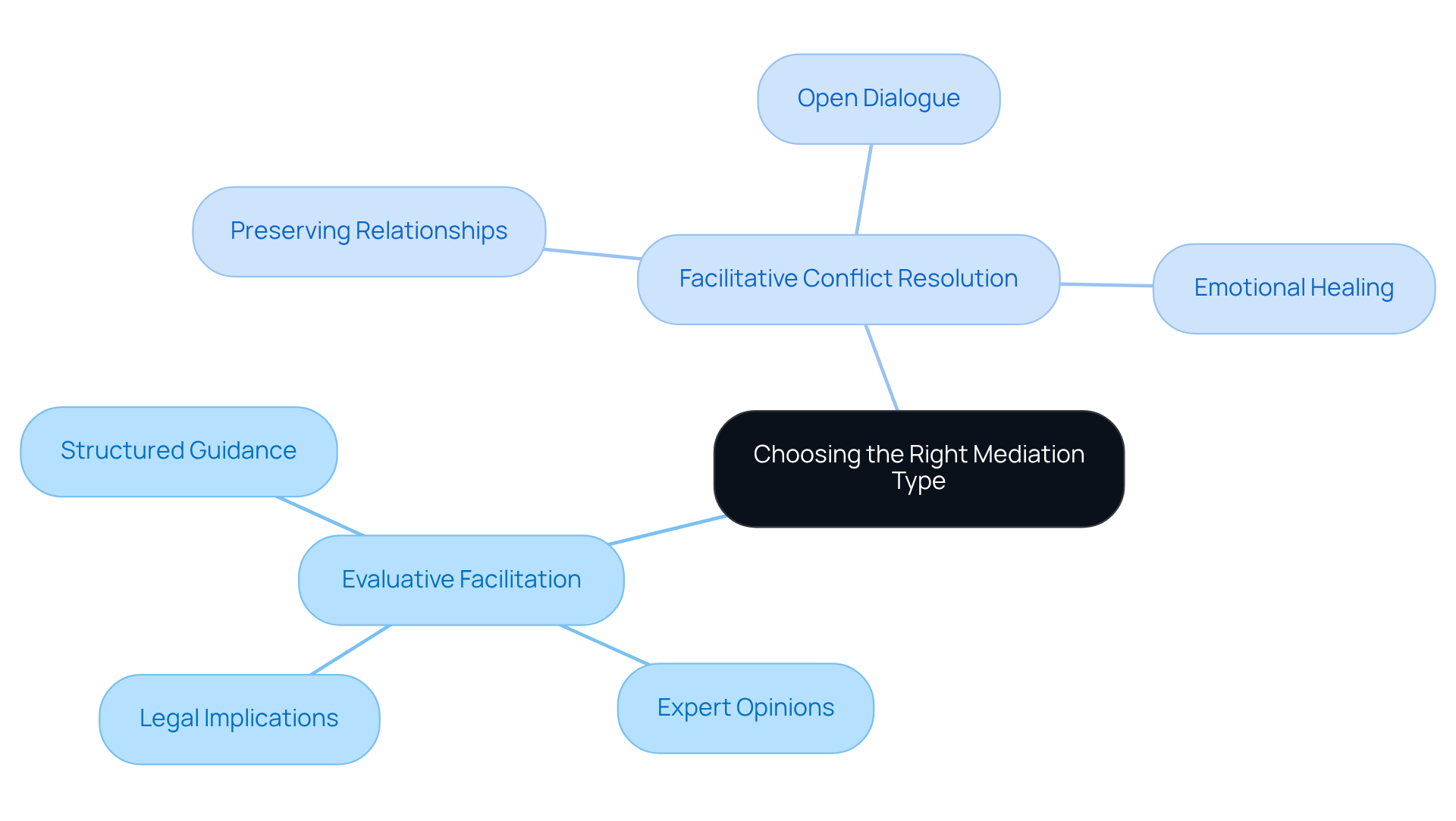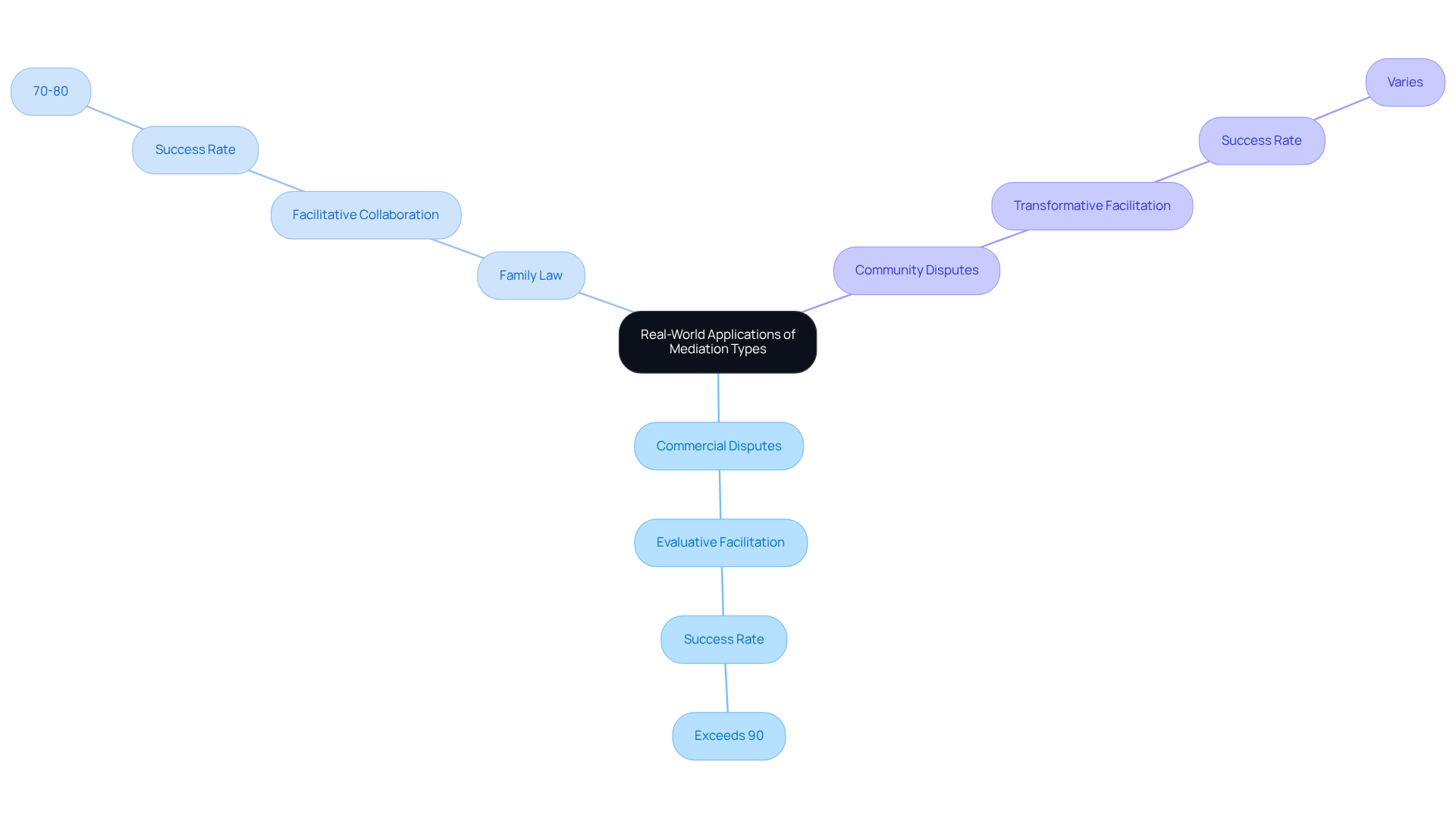
Types of Mediation: Evaluative, Facilitative, and Transformative Explained
Overview
In navigating conflicts, it's essential to understand the different paths available to us. The three main types of mediation—evaluative, facilitative, and transformative—each serve unique purposes that can significantly impact our resolution journey.
- Evaluative mediation, for instance, provides structured guidance, particularly beneficial in commercial disputes. This approach helps clarify options and potential outcomes, making the process feel less daunting.
- On the other hand, facilitative mediation focuses on enhancing communication, especially in personal conflicts. It encourages open dialogue, allowing individuals to express their feelings and needs, fostering a supportive environment.
- Then, there's transformative mediation, which goes beyond mere resolution. It nurtures personal growth and relationship repair, empowering individuals to take charge of their situations. This approach can be incredibly enriching, enabling us to choose the most suitable method tailored to our specific needs.
Reflecting on these options, which type resonates with you? Understanding these distinctions can help us navigate our conflicts with greater confidence and compassion. Remember, you are not alone in this journey; we are here to support you in finding the best path forward.
Introduction
Mediation emerges as a compassionate alternative to traditional conflict resolution methods, offering a collaborative approach that values understanding and cooperation. Have you ever felt overwhelmed by conflict? By exploring the three primary types of mediation—evaluative, facilitative, and transformative—you can discover the best strategy tailored to your unique disputes.
With so many options available, it’s natural to wonder which type will lead to the most positive outcome. This article gently guides you through the nuances of each mediation style, highlighting their distinct benefits and applications, while supporting you on your journey toward effective conflict resolution.
Define Mediation: Understanding Its Role in Conflict Resolution
Mediation is one of the types of mediation where a neutral third party, known as a mediator, helps facilitate communication between conflicting sides. This approach allows individuals to work together toward a resolution that feels right for them. Unlike litigation, where decisions are imposed by a judge, mediation encourages cooperation and discovery of mutually acceptable solutions. This process is particularly beneficial in various situations, including types of mediation for family disagreements, workplace conflicts, and commercial disputes. By emphasizing open dialogue, mediation creates a safe space for parties to express their needs and concerns, ultimately fostering understanding and collaboration.
Have you ever felt overwhelmed by conflict? The effectiveness of negotiation shines through its impressive success rates; research indicates that around 70-80% of conflicts settled through negotiation result in satisfactory agreements—far surpassing the outcomes of traditional litigation. Mediation is not only effective but also cost-efficient, saving millions for both employers and employees in workplace conflicts. For instance, in family disputes, conflict resolution can significantly reduce emotional burdens, leading to more harmonious relationships post-dispute. A notable example involved a lengthy custody battle where negotiation focused on the children’s best interests, highlighting the potential for positive outcomes even in delicate situations.
In workplace environments, facilitated discussions offer a proactive way to resolve conflicts, often preventing costly and time-consuming investigations. Take the U.S. Air Force, for example; they employ negotiation to address workplace issues at the lowest level, enhancing mission readiness and fostering better communication among personnel. This approach not only saves time and resources but also nurtures a culture of teamwork and respect, underscoring the importance of supportive leadership in conflict resolution.
Overall, the types of mediation emerge as a preferred method for resolving disputes, providing a more human-centered alternative to litigation. Its emphasis on collaboration and understanding makes it an effective tool for achieving lasting resolutions in various conflict scenarios. So, why not consider mediation as a compassionate pathway to resolving your conflicts? You deserve a resolution that honors your needs and fosters harmony.

Explore Types of Mediation: Evaluative, Facilitative, and Transformative
Mediation, which is a compassionate approach to resolving conflicts, can be categorized into three primary types of mediation: evaluative, facilitative, and transformative. Each type serves a unique purpose, and understanding them can help you find the best path forward.
-
Evaluative Mediation: In this method, the mediator offers insights into the strengths and weaknesses of each side's position. By suggesting possible outcomes based on legal standards or industry norms, the mediator helps you understand the potential consequences of your decisions. This approach is particularly effective in commercial disputes, where legal implications weigh heavily. Did you know that around 62% of mediators use the evaluative approach? It often leads to higher settlement rates due to its structured nature. Plus, mediation is generally quicker and more affordable than court hearings, making it an appealing option for many.
-
Facilitative Mediation: Here, the mediator focuses on enhancing communication and understanding among those involved, without imposing solutions. By promoting open conversation, the mediator assists you in exploring your interests and needs. This method shines in personal disagreements, such as family or community conflicts, where maintaining relationships is crucial. Imagine resolving a family dispute in a way that nurtures harmony and emotional well-being. Experts like Dr. Gary Clayton emphasize that facilitative intervention not only achieves effective settlement rates but also addresses the relationship issues that matter most to you.
-
Transformative Mediation: This type emphasizes personal growth and the repair of relationships. The mediator guides you in recognizing and addressing the underlying emotional issues fueling the conflict. By fostering empathy and mutual respect, transformative mediation aims to reshape the dynamics of your relationship, creating a more constructive path forward. This approach is particularly successful in situations where ongoing relationships are vital, such as in family or workplace environments, as it encourages a deeper understanding of one another's perspectives.
By understanding the various types of mediation, you empower yourself to choose a strategy that best fits your unique situation and needs. This not only increases the chances of a successful outcome but also nurtures a sense of connection and support throughout the process. Together, we can navigate these challenges with compassion and understanding.

The Importance of Choosing the Right Mediation Type
Selecting the right types of mediation is crucial for aligning the process with your goals and the unique nature of your dispute. Have you considered how evaluative facilitation might be particularly suitable for conflicts with clear legal implications? It offers structured guidance and expert opinions on potential outcomes, helping you navigate through the complexities. As Knight Mediations beautifully puts it, "Mediation is not just a bridge between conflict and resolution, but a pathway towards understanding, empathy, and lasting harmony."
On the other hand, if your conflict is personal, facilitative conflict resolution may be the better choice. This approach prioritizes preserving relationships, allowing individuals to engage in open and cooperative conversations. Can you imagine how transformative dialogue can be in situations that focus on emotional healing and rebuilding connections? It fosters understanding and empathy between conflicting parties, creating a safe space for growth.
By recognizing the strengths and weaknesses of each of the types of mediation, you can make informed decisions that significantly enhance your chances of achieving a successful outcome. Remember, ADR is dedicated to a resolution-centered method. With a broad network of upscale meeting spaces and virtual session alternatives, you can choose the most suitable conflict resolution style for your specific situation. Key features, like flexible scheduling and a streamlined booking process, further enhance the accessibility and effectiveness of their services. You deserve a path toward resolution that feels right for you.

Real-World Applications of Mediation Types
Mediation serves as a beacon of hope across various sectors, each finding unique benefits through different types of mediation that meet their specific needs. In commercial disputes, evaluative facilitation becomes essential, offering parties a clear understanding of potential outcomes. This clarity not only expedites resolution but also alleviates anxiety about the unknown. Imagine a scenario where companies engaged in evaluative conflict resolution achieved settlement rates exceeding 90%. This remarkable efficiency underscores the power of mediation in navigating complex negotiations.
In the realm of family law, facilitative collaboration shines by enabling parents to come together and create parenting plans that truly prioritize the children's best interests. This nurturing method fosters cooperation and significantly enhances the likelihood of sustainable agreements. Consider the heartwarming stories from families who, through supportive negotiation, reported a success rate of around 70-80%. Many expressed improved communication after the process, reflecting the positive impact of mediation. In Florida, family law negotiations mirror this success, with rates ranging from 70% to 80%, reinforcing the effectiveness of this compassionate approach.
Transformative facilitation has also proven its worth in community disputes, focusing on rebuilding trust and encouraging cooperation among neighbors. This method promotes open conversations, leading to solutions that strengthen community bonds. Have you ever witnessed how conflict resolution can preserve relationships and foster mutual understanding? It is vital in community settings, where connection matters most. The adaptability of various types of mediation across these contexts highlights its value as a versatile tool for conflict resolution, ready to address the unique dynamics of each situation. Together, we can embrace mediation as a pathway to healing and understanding.

Conclusion
Mediation stands out as a vital method for resolving conflicts, offering a compassionate alternative to traditional litigation. By engaging a neutral mediator, we can collaboratively explore our needs and work towards a resolution that honors our interests. This approach not only fosters understanding but also paves the way for sustainable agreements, emphasizing the importance of dialogue over confrontation.
In this article, we delve into three primary types of mediation:
- Evaluative mediation provides structured guidance.
- Facilitative mediation nurtures relationships.
- Transformative mediation promotes personal growth.
Understanding these differences empowers you to choose the most suitable approach for your unique situation, enhancing the likelihood of successful outcomes.
Ultimately, embracing mediation as a conflict resolution tool can lead to more harmonious relationships and a deeper understanding among all parties involved. Whether in family disputes, workplace conflicts, or community issues, the versatility of mediation demonstrates its capacity to heal and connect.
Consider exploring these mediation types to find the best path forward. How might fostering empathy and collaboration transform your approach to conflict resolution? Together, we can create a more understanding and supportive environment for everyone.
Frequently Asked Questions
What is mediation?
Mediation is a conflict resolution process where a neutral third party, known as a mediator, facilitates communication between conflicting sides to help them work toward a mutually acceptable resolution.
How does mediation differ from litigation?
Unlike litigation, where decisions are imposed by a judge, mediation encourages cooperation and the discovery of solutions that feel right for both parties involved.
In what situations is mediation particularly beneficial?
Mediation is beneficial in various situations, including family disagreements, workplace conflicts, and commercial disputes, as it fosters open dialogue and collaboration.
What are the success rates of mediation compared to traditional litigation?
Research indicates that around 70-80% of conflicts settled through negotiation result in satisfactory agreements, which is significantly higher than the outcomes of traditional litigation.
How does mediation save costs in workplace conflicts?
Mediation is cost-efficient, saving millions for both employers and employees by resolving conflicts without the need for costly and time-consuming investigations.
Can you provide an example of mediation in family disputes?
A notable example involved a lengthy custody battle where negotiation focused on the children’s best interests, leading to positive outcomes and more harmonious relationships post-dispute.
How does mediation benefit workplace environments?
Facilitated discussions in the workplace help resolve conflicts proactively, enhancing communication, saving time and resources, and nurturing a culture of teamwork and respect.
Why is mediation considered a preferred method for resolving disputes?
Mediation is preferred because it provides a more human-centered alternative to litigation, emphasizing collaboration and understanding for achieving lasting resolutions.


